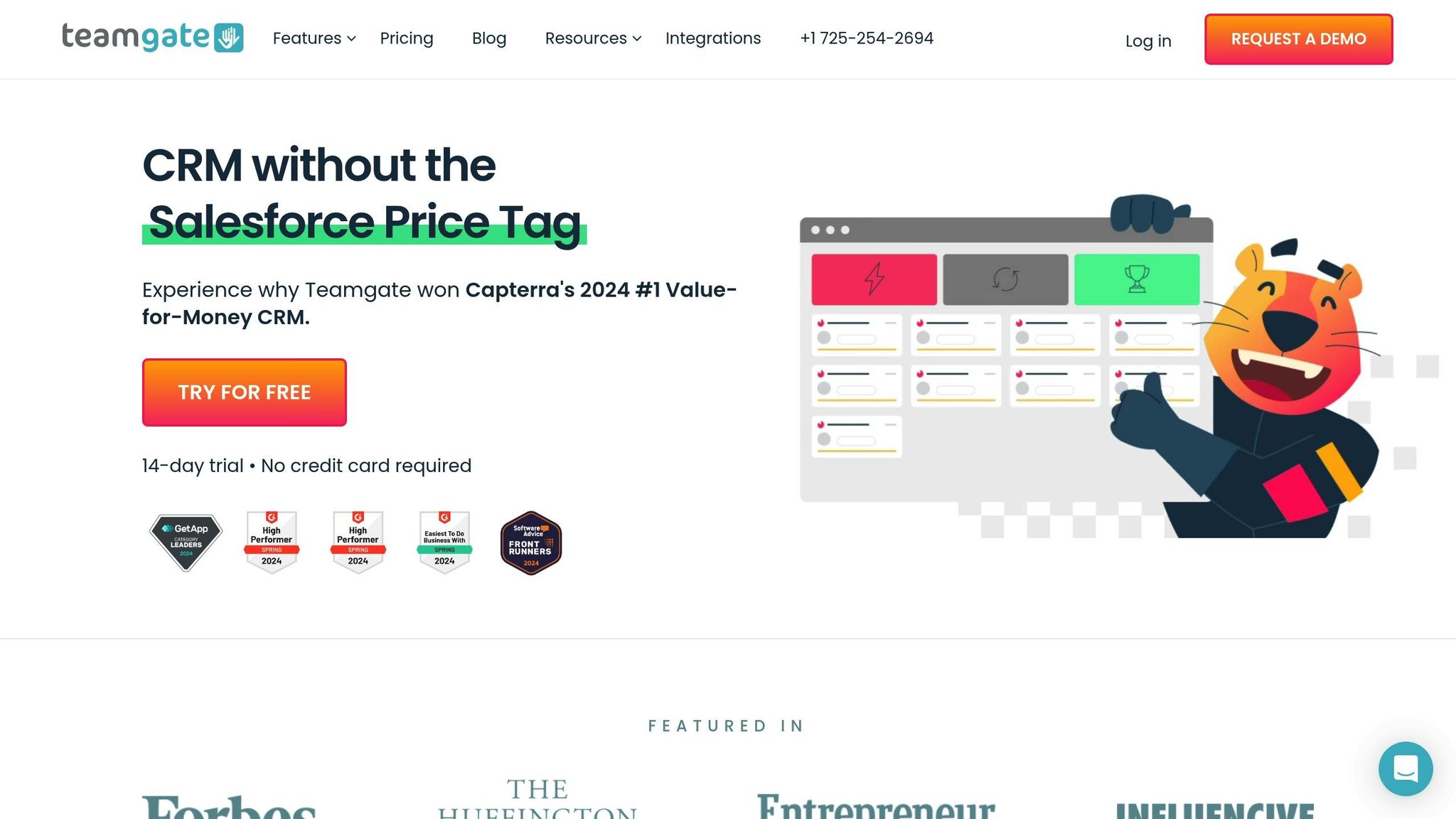AI has already transformed solution selling by making it faster, more data-driven, and dare we say it, even easier. Sales teams today use AI tools to analyze customer behavior, predict needs, and deliver personalized solutions – all while preserving the human touch. Here’s what you need to know:
- AI enhances customer analysis: Spot pain points, predict needs, and provide instant feedback.
- Streamlined sales tasks: AI automates lead qualification, scheduling, follow-ups, and proposal creation.
- Challenges in solution selling: Adapting to custom demands, managing multi-step buying processes, and proving ROI with data.
- Key strategies for success: Know your product, identify pain points, ask the right questions, educate customers, and deliver measurable results.
Using AI for Sales & CRM Management
Current Solution Selling Obstacles
Solution selling comes with its own set of challenges as sales teams navigate changing customer expectations and increasingly intricate buying cycles. Not to mention buyers are having a hard time distinguishing the benefit of your specific solution in increasingly crowded markets. Below, we break down these hurdles and share strategies to address them effectively.
Meeting Customer Demands for Custom Solutions
Today’s buyers want solutions tailored to their specific needs, which makes one-size-fits-all approaches far less effective. Sales teams are now tasked with delivering personalized solutions that still maintain high standards and relevance.
“One solution selling strategy that has proven highly effective for us is the consultative approach. Rather than simply pushing our products, we focus on understanding the unique needs of our customers. Our sales team actively engages with potential clients, asking questions, and genuinely listening. This approach enables teams to tailor offerings precisely without extraneous details.” – Isaac Robertson, Co-founder of Total Shape
Key challenges include:
- Extensive product knowledge: Teams must have a deep understanding of their offerings to create tailored solutions.
- Quick adjustments: The ability to modify solutions in real time as customer needs evolve.
- Scaling personalization: Delivering customized solutions across a broad client base without sacrificing quality.
Managing Multi-Step Buying Processes
B2B sales cycles have become more intricate, often involving multiple decision-makers and lengthy approval steps. These complexities bring unique challenges:
| Challenge | Impact | What’s Needed |
|---|---|---|
| Extended Sales Cycles | Delays in closing deals | Strong pipeline management |
| Multiple Stakeholders | Harder to align decision-makers | Clear and coordinated communication |
| Budget Constraints | More scrutiny on spending | Strong ROI justification |
| Technical Validation | Lengthy testing requirements | Solid proof-of-concept demonstrations |
“Everyone is constantly glued to LinkedIn these days, and being an active and helpful LinkedIn user will help you stand out from the massive crowd of other salespeople. Providing value and shedding love on LinkedIn posts will allow you to build trust with your prospects. When they inevitably comment or share a post on LinkedIn that references a problem their business or organization is dealing with that your solution solves for, you can leverage all of your prior engagement to generate a customized, effective, and warm solution selling pitch.” – Adam Purvis, Account Manager at Coconut Software
Showing Results with Data
Another major hurdle is proving the value of solutions through measurable results. Buyers want clear evidence of success, which means sales teams need to:
- Track performance: Monitor how well solutions are working after implementation.
- Prove ROI: Clearly outline financial benefits and the overall impact on the business.
- Use benchmarks: Compare outcomes to industry standards to establish credibility.
- Define success metrics: Create specific KPIs to measure the effectiveness of each solution.
The challenge lies in gathering, analyzing, and presenting this data in a way that’s both compelling and accurate while respecting privacy concerns. Sales teams must strike a balance between highlighting strong results and setting realistic expectations for potential customers.
AI’s Impact on Solution Selling
Using AI for Better Customer Analysis
AI is changing the game for customer analysis, offering sales teams a smarter way to understand and address customer needs. By processing massive amounts of interaction data, AI helps identify patterns and predict what customers might need next.
Here’s how AI improves customer analysis:
- Spotting buying signals and pain points through interaction analysis
- Predicting customer needs using historical data and market trends
- Providing instant feedback on customer engagement and responses to proposals
With these insights, AI also takes over repetitive sales tasks, freeing up time for more strategic work.
AI Tools for Sales Tasks
AI simplifies tedious sales activities, enabling teams to focus on building relationships and crafting solutions. These tools make a real difference in everyday tasks:
| Sales Task | AI Feature | Benefit |
|---|---|---|
| Lead Qualification | Automated scoring and prioritization | Better use of resources |
| Meeting Scheduling | Smart calendar management | Less admin work |
| Follow-up Tasks | Automated reminders and tracking | Faster responses |
| Proposal Creation | Dynamic content generation | Quicker document preparation |
This shift highlights how modern AI tools stack up against older, manual methods.
Old vs. New: Solution Selling Methods
AI has reshaped solution selling by making it more precise and data-driven. While the goal of solving customer problems remains the same, the tools and strategies have evolved significantly.
| Aspect | Traditional Approach | AI-Powered Method |
|---|---|---|
| Customer Research | Manual and intuition-based | Data-driven with predictive insights |
| Solution Development | Generic templates | Custom solutions generated dynamically |
| Follow-up Strategy | Fixed schedules and standard steps | Adaptive timing based on engagement |
| Performance Tracking | Monthly or quarterly reviews | Real-time insights and adjustments |
sbb-itb-5772723
Using Teamgate CRM for AI-Powered Sales

Tools for Solution Selling
Teamgate CRM transforms solution selling into a data-driven process with its AI-powered tools. One standout feature is the SmartDialer™, which allows direct calls from the CRM, eliminating delays and boosting efficiency.
Research shows that phone conversations convert leads 70% more often. Teamgate capitalizes on this with features like:
- Custom Pipeline Design: Create tailored sales funnels for specific solutions.
- Engagement Tracking: Monitor interactions across multiple channels.
- Predictive Insights: Identify opportunities using AI-driven analysis.
These features tackle the challenges of personalization and speed in today’s sales environment.
Unified Sales Tools and Systems
Teamgate brings essential sales tools together in a single interface, simplifying workflows and delivering immediate results.
“With Teamgate’s intuitive interface, our user adoption was immediate. Even with a remote team consisting of sales, customer success and marketing – we were onboarded and up and running within hours.”
- Jack Hodges, Sales Manager, FiveCRM
“With in-depth insights and metrics, Teamgate truly is the only CRM designed specifically for SaaS teams. We were up and running within days and immediately increased productivity and efficiency of our sales teams resulting in a 132% increase in conversion rates!”
- Allison Barkley, Director of Operations, Baremetrics
Tracking Sales with Teamgate Reports
Teamgate enhances sales performance with detailed tracking and analytics. This addresses a key issue: nearly half of sales teams fail to use data for accurate forecasting and decision-making. The analytics suite includes:
| Tracking Feature | Business Impact | ROI Potential |
|---|---|---|
| Performance Analytics | Real-time insights into teams | Better decision-making |
| Sales Forecasting | Data-backed predictions | Smarter resource allocation |
| Lead Analytics | Improved targeting strategies | Increased conversion rates |
For every $1 invested in Teamgate CRM, businesses report an average return of over $8.
“Utilizing sales insights, we’ve been able to conduct targeted experiments, enabling Packagecloud to increase engagement rates by 18% through the refinement of scripts and lead targeting.”
- Krish Sivanathan, Director of Operations, Packagecloud
Tracking Results and Improving Methods
Accurate tracking and constant refinement are key to boosting sales performance, especially when using AI tools and detailed reporting.
Key Metrics for AI-Driven Sales Success
Keep an eye on both short-term results and long-term trends by focusing on key performance indicators (KPIs). Sales teams use these metrics to fine-tune their strategies and improve outcomes.
Here’s a breakdown of important metrics:
| Performance Area | Key Metrics | Why It Matters |
|---|---|---|
| Sales Trajectory | Win rate percentage, average deal size, sales cycle length | Measures overall sales efficiency and growth |
| Customer Value | Customer lifetime value, profit margins, cross-sell rates | Highlights the most profitable customer segments |
| Process Efficiency | Lead-to-opportunity ratio, deal closure time, lost deal analysis | Identifies areas for streamlining processes |
Practical Tips for Better Results
Use data to guide your decision-making and adjust your solution-selling strategies. Tools like the Insights section in Teamgate CRM provide real-time metrics to help you make informed changes.
- Track performance regularly: Analyzing individual and team win/loss patterns can reveal trends in deal closures.
- Focus on high-value customers: Use profitability metrics to identify and prioritize clients who bring in the most revenue.
- Streamline your processes: Evaluate sales trajectory data periodically to uncover inefficiencies and better align with customer expectations.
Review performance reports often, and use visual data to identify trends. These insights help teams refine their strategies and continuously improve their approach to solution selling, ensuring they stay ahead in a competitive market.
Conclusion: Making AI Work in Solution Selling
AI integration has reshaped solution selling, making it more efficient and informed by data. For instance, companies using AI-powered CRM tools see impressive returns – averaging over $8 for every $1 spent. Yet, surprisingly, only half of sales teams leverage data for accurate forecasting.
These results highlight how AI-driven sales processes can boost conversion rates and improve both efficiency and revenue. A great example is Teamgate CRM, which blends AI tools with personalized human interaction to drive strong sales outcomes. You can also utilize tools like Humanize AI and AI Paraphraser to generate human-like AI-generated content to make the most of your time and maximize effective outreach.
Success in today’s solution selling relies on combining data-driven decisions, streamlined workflows, and real-time metrics through integrated dashboards. This approach not only enhances effectiveness but also preserves the personal touch that’s crucial in building strong customer relationships.
In short, pairing AI with established sales strategies offers a smarter, more connected way to meet customer needs while keeping the human element at the heart of every interaction.
FAQs
How does AI help sales teams better understand customer needs in solution selling?
AI enhances solution selling by analyzing vast amounts of customer data to identify patterns, preferences, and pain points. This allows sales teams to gain deeper insights into customer behavior and needs, enabling them to craft more personalized solutions.
By leveraging AI, businesses can anticipate customer challenges and proactively offer tailored recommendations, making the sales process more efficient and customer-focused. This approach not only builds stronger relationships but also improves overall sales performance.
What challenges do sales teams face when adopting AI in solution selling, and how can they address them?
Sales teams often encounter challenges like data privacy concerns, a lack of skilled talent, and the need for the right technological infrastructure when adopting AI in solution selling.
To tackle these issues, businesses should prioritize robust data privacy and security measures, invest in training programs to upskill their teams, or hire professionals with AI expertise. Additionally, ensuring access to the necessary hardware, software, and network capabilities will set the foundation for a successful AI implementation.
How can sales teams showcase ROI and measurable outcomes when using AI-powered tools in solution selling?
Sales teams can effectively showcase ROI and measurable outcomes by using AI-powered tools to analyze extensive customer data and uncover actionable insights. AI enables businesses to tailor their offerings to meet specific customer needs, resulting in increased satisfaction, loyalty, and profitability.
Additionally, predictive analytics can identify potential sales opportunities and forecast future trends. This allows teams to allocate resources more efficiently, refine their strategies, and focus on high-value prospects, ultimately driving better results and demonstrating clear value to stakeholders.





